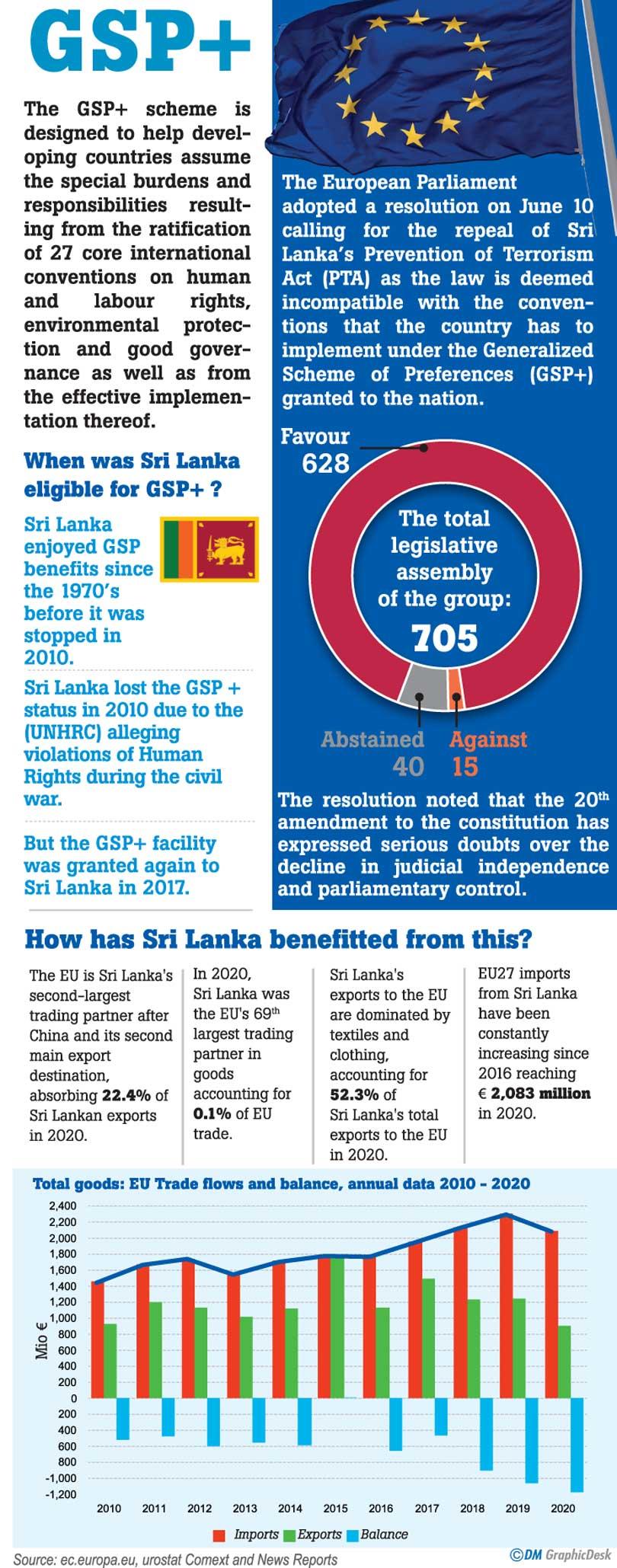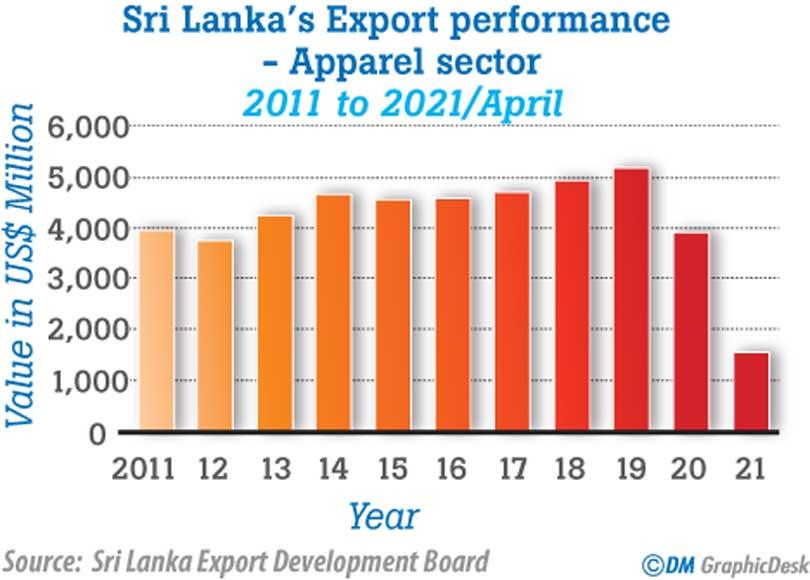Reply To:
Name - Reply Comment

By Kamanthi Wickramasinghe
At a time when Sri Lanka faces the possible danger of losing its GSP Plus concession, economic experts warn that having to pay duty will make the country less competitive in the International market.
Economists have sounded alarm bells as the European Parliament dropped a bombshell last week on the likelihood of Sri Lanka losing its GSP Plus concession. On June 10, a resolution was adopted by the European Parliament urging the European Commission to temporarily withdraw Sri Lanka’s GSP+ status.
As Sri Lanka is experiencing a three-week lockdown following a third wave of the pandemic, the apparel industry was one among a few essential services that was allowed to function.
Benefits
GSP+ aims at supporting Sri Lanka’s economic development through more trade with the EU, as well as contributing to diversifying exports and attracting investments. These one-way trade preferences will consist of the full removal of duties on 66% of tariff lines, covering a wide array of products including textiles and fisheries. The GSP+ scheme resulted in significant benefits for apparel exports due to the significant contrast between its tariff rates and those of standard GSP. The scheme encourages increased value addition within Sri Lanka, resulting in the setting up of new industries, and creating new employment opportunities in the country.
Withdrawal will affect Sri Lanka’s exports
“The withdrawal of GSP+ will affect Sri Lanka’s exports to the European Union (EU) and will show that the country has not reached an economic status to compete with other countries in the International market,” cautioned Sirimal Abeyratne, Professor in Economics at University of Colombo.
“GSP+ is given to eight countries and according to the eligibility criteria, these nations should be vulnerable, developing countries with low level of exports to EU countries. This means it has to be a poor country because the term vulnerable means it can’t stand against external shocks,” he explained. At present, the GSP + preference is extended by the EU to Armenia, Bolivia, Cabo Verde, Kyrgyzstan, Mongolia, Pakistan, The Philippines, and Sri Lanka.
“The second criterion is that Sri Lanka should ratify certain International conventions to receive GSP+. But we haven’t been able to implement some of these conventions,” Prof. Abeyratne added.
Country’s sovereignty infringed
Expressing the government’s stance Co-Cabinet Spokesperson Keheliya Rambukwella said that it was a total misconception and added that the EU was holding a sovereign nation to ransom.
“Referring to the PTA is an interference and infringement of sovereignty” Rambukwella said. He said that the Foreign Ministry will deal with the matter.
Govt. not keen on liberalisation of trade
“The quite obvious economic impact is exporters having to pay duty and be less competitive in the international market,” opined Samagi Jana Balawegaya MP Dr. Harsha De Silva. “Research has shown that we were unable to leverage on the opportunities that arose when we lost GSP+ in the previous instance. During 2010-2016 exports to EU grew between 6-7%. It was a period where we would have been able to diversify into other areas such as duty free access. It’s not just apparel exports that benefit from this scheme. But if you look at the 2017-2020 period, exports to Europe were between 26-27%,” he said.
“The government is saying that we’re considering ways to become competitive on our own. But in reality we need to do a lot more and bring about a unilateral trade agreement and other reforms for our industries to become more competitive in the global marketplace. However, the government is not even keen on the concept of liberalisation of trade. The government is increasing duties, blocking trade and de-linking the country with the rest of the world. So how can our industries compete?” he questioned.
GSP+ misused by successive govts
When Sri Lanka lost its GSP + concession in August 2010, it faced export revenue losses of around Rs. 250 billion. In 2017 when the Scheme was reintroduced Sri Lanka reported the highest ever export earnings totalling USD 15.1 billion. “The purpose of introducing GSP + was to ensure good governance and people’s rights,” opined Anton Marcus, Free Trade Zones and General Employees Union General Secretary. “In 2017, we supported the then government to get GSP+. Once the government got the GSP+ scheme we requested the regime to have a National Monitoring Committee. Initially they set-up a tripartite monitoring committee only to be dismissed later on. GSP+ benefits have been misused by successive governments. We raised various violations during the Yahapalana Government and many strikes too were oppressed. We believe that GSP+ is one of the tools we can use to improve the Human Rights situation in the country.” said Marcus.
Human Rights/legal experts concerned
Meanwhile Human Rights and legal experts explained that losing GSP+ will be a direct repercussion of Human Rights violations in the country.
Human Rights Lawyer Dr. Gehan Gunatilleke said that the provisions of the Prevention of Terrorism Act (PTA) were inconsistent with the Sri Lankan Constitution and with the International Covenant on Civil and Political Rights. “Sri Lanka is party to the International Covenant on Civil and Political Rights and has international obligations to ensure that its law complies with this treaty,” he said.
Mr.Gunatilleke added that while some repercussions of Human Rights violations might be ‘external’, as in the case of losing GSP+ concessions, the most serious repercussions will be ‘internal’.
-We raised various violations during the Yahapalana Government and many strikes too were oppressed. We believe that GSP+ is one of the tools we can use to improve the Human Rights situation in the country.

